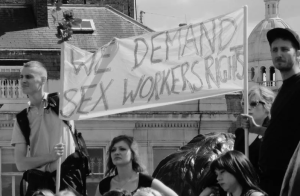This week, as part of the #WhoSpeaksForUs campaign, there was a gathering for sex workers outside Parliament in anticipation of the forthcoming elections.
A group of activists from civil society and sex workers gathered outside Parliament in Cape Town Tuesday, May 23, in anticipation of next week’s elections.
The group started a campaign dubbed #WhoSpeaksForUs, under the direction of the Sex Workers Education and Advocacy Taskforce (SWEAT). Reminding political leaders to consider South Africa’s diverse population is the campaign’s goal. At the time of the gathering, no legislators were present in Parliament. As a result, it served more as a symbolic act than a means of direct communication.
The #WhoSpeaksForUs movement calls for fair representation for marginalised communities in politics and the decriminalisation of sex work. The movement wants to create a society where everyone is treated fairly, regardless of their sexual orientation, colour, or socioeconomic status.
Gender DynamiX, the Asijiki Coalition for the Decriminalisation of Sex Workers, Triangle Project, Imbawula Queer Podcast, and Gender Equity Unit were among the other advocacy groups who joined the demonstration.
SOUTH AFRICA’S BILL ON SEX WORK
The current draft law has undergone a thorough public consultation process. In order to better protect sex workers from abuse, violence, and other problems, it decriminalises the industry. Concerns have been raised, nevertheless, because the measure does not contain enough provisions to adequately regulate sex industry. The passage of the measure has been delayed as a result. Therefore, the newly elected Parliament will be in charge of revising the measure.
In December 2022, the government released the Criminal Law (Sexual Offences and Related Matters) Amendment Bill. The draft measure decriminalises sex work in order to protect sex workers from assault and other threats, but it makes no provisions for how this legislative reform will affect current rules. As a result, local laws will continue to apply to sex workers.

Research challenges popular beliefs about sex work
Extensive research was done on the decriminalisation of sex work in South Africa by Dr. Marna Lourens of the University of Stellenbosch’s Centre for Social Justice. In relation to adult sex workers, her dissertation offers a critical evaluation of transformative justice. The study sheds light on the real-world realities of sex workers. It highlights the necessity of
Lourens noted that many South African women choose to do sex work as a way to afford food. The country’s level of poverty and widespread unemployment are factors that play a role in this situation.
Leave a Reply